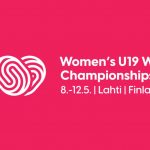They did it: the German Women Soccer Bundesliga (Flyeralarm Frauen-Bundesliga) re-started a few days ago, on 29th May 2020. I hope it does not hurt the ladies if I state that the interest on the first matches was rather limited in Germany – at least, some matches will be shown live in Scottish TV. Business as usual? In the days before the matches, three players gave very clear statements. Thus I felt to write this posting and praise Rachel Rinast, Sharon Beck and Julia Arnold.
To me, an Interview of the Year: Rachel Rinast
It is nearly ten years ago since I decided to stop active female soccer coverage on my previous website, frauenfussball-foto.de (which means: women soccer photography). I of course followed the ladies doing the sports, especially my favorite team, Cologne. During that time of here and then following the team, I was always fascinated by 1991-born Rachel Rinast, who is currently playing for Cologne the third time in her career (2010-2012, 2013-2016, since 2019). Rachel Rinast, who decided to play for the Swiss national team despite for Germany with her double citizenship, is a very strong personality and multi-talented – for example, she recorded United in Red, some sort of the official song of the Swiss team during the 2017 European Championships.
An Interview at Germany’s most famous TV Sports Format
The reason why Rinast was quite in focus the week before the first matches was an interview at the ARD Sportschau, which is likely the most famous – and important – sports format in German TV. You can watch the interview at the Sportschau homepage – please note that they will remove it in May 2021.
Some key points of the interview in English:
- Right at the beginning, Rinast stated that she personally thinks that the decision to play on is a wrong decision – and on the other hand that she is very thankful for the club’ support in that unfortunate situation.
- The key reason she states is that due to the very short preparation time and the dense match schedule is the high risk of injuries, not only a the Cologne team.
- Another key items she stated is that some teams had a comparably long preparation time. Cologne’s was comparably brief, but there has been team training – in contrast to Jena, where it was still not allowed at the time of the interview.
- The interview becomes really interesting when the journalist confronts her with the argument of equality of men and women and that this is a key argument of the German Soccer Association. Rinast stated that equality is a matter of the heart to her, but then she is really talking herself in rage, calling it risky and bold, as there is obviously to structural and economic equality between the men and the women top division. She states that it is even tough for the male professionals, but she understand the economic pressure.
- She stated that the quarantine rules require to take annual leave for the quarantine period and all the in-week matchdays. Overall, the Cologne team is quite lucky with the support of the employers of the players (who majorly work or study in parallel) – but Rinast also calls that an unreasonable demand for the people who finally pay for her life that they are also more or less forced to support it.
Strong Words from Freiburg – Sharon Beck
Another example for very open-minded critics was a podcast interview which SC Freiburg’s Sharon Beck gave to the SWR regional broadcasting station. You can listen to it here – you again have to speak German to understand it. The podcast (roughly 18 minutes) covers more topics like why Sharon Beck decided to play for the Israeli national team instead of playing for Germany and how the sports is developing in that country, which is a very interesting as such. But they also deal with the re-start of the Women Bundesliga, majorly in the second part of the interview. Beck is injured and thus not able to play. The key points of her statement are very similar to the ones Rinast gave:
- The first critics she gives is on the equality argument about continuing the Women Bundesliga, as Rinast did as well.
- She is not afraid of the economic impact of a potential season withdrawal, as there is so much money in German soccer as such.
- Talking about financial equality, she states that in some countries like England or Spain, female soccer players can already train under really professional conditions with adequate pay. Germany is still under development.
- The Freiburg players have been asked whether they want to play on in the league or not. She said that she is not allowed to disclose the result of that, but then adds that if you think about the conditions and potential effects of the re-start at the ladies, you have to vote to stop the season. The first example she states is Jena, who are not able to do team training at all.
- She clearly states that she is against playing on. The health of the players is subordinate in that decision. Having teams like Jena playing three matches in a week after three days of training is just too risky.
- Equality is also a matter of financial equality. Like Rinast, she points on the necessity to take leaves from work and the financial (and organisational) implications that has.
- She also feels that the decision is just about not to leave sponsors and money and that there is no care for the integrity of the sports(wo)men.
Unlucky Ones – FF USV Jena and Julia Arnold
As German soccer is currently quite in international focus, there have even been interviews with players in international media. Julia Arnold, team captain of FF USV Jena, talked to L’Equipiere in a French interview. She explains that they have small group training with distancing since 18th May, but no team training yet. Thus, there is comparably low intensity, while other teams already trained for five or six weeks. She also clearly states that she thinks that if the regional spots bans would have hit a major Women soccer team like Munich or Potsdam, the association would not have taken the same decision. We must have the same conditions. In Jena, we are amateurs, we play soccer because we love it (English translation by google translate). Though it is a good sign that women soccer continues, she says, I don’t understand why they want to include women at all costs. There are so many more important things than soccer[…]. Of course, she states the health of her team as a key concern as well.
Independently from their club as a private initiative, the Jena players also did a social media campaign against the re-start, which attracted some attendance. The club repudiated from the statements, clearly declaring them as a a decision by the players, not the club.
Some Facts – What does the re-start mean for Cologne and Jena
As the players stated financial equality between men and women, you find several sources (.e.g this one), which state that the average income of a Women Soccer Bundesliga player in the 2017/18 season was roughly 39,000 Euro, which is about the average German income. This is about a fourth of the average of the men third division (“3. Liga”) players. You, however, have to state that the spread between the players’ salaries is massive within the German Women Soccer Bundesliga. There are professionals with comfortable payments, but quite a proportion of the players will earn less than the average stated and thus is studying or working in parallel. I would even guess that in teams like Jena, none of the players is hitting that amount of 39,000 Euro at all. There may be professional teams like VfL Wolfsburg or Bayern Munich, but even if the figures improved slightly in the last two years, the Flyeralarm Women Soccer Bundesliga is not a professional sports league.
In addition to that, Cologne made an interesting statement on their website teasing the re-start of the matches. In the middle of the article, Sascha Glass, coach of the team states, We have 15 players which follow another main profession. We had to take two out of them out of the squad, as their work cannot be brought inline with the infection protection rules of the league re-start. The full squad given at the club’s homepage contains 25 players (some of them may majorly pursue matches in the second team). Having to skip two of them in a high playing frequency low preparation period is of course quite a hit.
Match Schedule (Cologne)
In order to illustrate the tight match schedule, I put the Cologne match schedule below. They have eight matches within 30 days, i.e. a match every 3.75 days in average. Some teams are even hit harder, for example as they have to play German cup, which will also be continued. Due to the legal situation, Jena starts the season on 7th June 2020, completing their seven matches (Cologne’s one against Duisburg is a postponed one) within 21 days.
| Date / Time | Home / Away | Opponent |
|---|---|---|
| Fr 29.05.2020, 14:00 | Away | VfL Wolfsburg (result 0-4) |
| Th 04.06.2020, 18:00 | Away | MSV Duisburg |
| Su 07.06.2020, 14:00 | Home | SGS Essen |
| We 10.06.2020, 16:00 | Home | FF USV Jena |
| Su 14.06.2020, 14:00 | Away | SC Freiburg |
| We 17.06.2020, 14:00 | Home | Bayern Munich |
| Su 21.06.2020 | Away | Bayer Leverkusen |
| Su 28.06.2020 | Home | SC Sand |
Why I feel ashamed to praise Rinast and Beck?
My first reaction when I saw Rachel Rinast’s words at the Sportschau was that this is already my interview of the year. I enjoyed how reflected, straight and also respectful to the other teams her words have been. As said above, I always loved to follow this sportsperson, and that was another reason why. Sharon Beck’s podcast episode is also very impressive, especially as it also gives some look behind the scenes in very different aspects of the sports.
On the other hand, I felt ashamed that I love it so much. What have these ladies done? They just said what they think and feel. They have been honest. It more and more became clear to me that at the sex which is likely broadcasted in soccer some 98 per cent of the time in Germany, this is something unusual. One example was Birger Verstraete, who somehow had to excuse himself that he is afraid of the risk he is taking in the current situation (see my original posting on the Bundesliga re-start). It is a shame that this normal behavior feels special in the economically dominated, streamlined business of soccer as it is majorly shown nowadays.
If you miss Julia Arnold in this list, you may regard it as unfair. I love her honest words as well. But I feel that Jena should have declined to re-start the league. I feel that, being the last team in the league table, they too much felt a risk of avoiding being relegated. They paid for that decision by the health of their players. I agree to all three girls that this is obscene – and praise Cologne that they at least voted with abstention.
These Ladies may be Idols
I am not too positive that people will care more about Women Soccer just because there is no other sports on TV now. Women Soccer had its big chance for a breakthrough in the early 2010’s in Germany, when national team matches could sell out the country’s biggest soccer arenas. The clubs and the association spoiled it and the sports never really recovered – nowadays, Spain and England are the bigger players in Europe. But these interviews showed why you should be able to identify with that sports so much: Women Soccer still has these great characters.
Rinast, Arnold and Beck are both leaders in their teams on the pitch, but they are also great persons outside of it. They are straight, even in situations where in Frankfurt, at the headquarters of German soccer, people very likely would love them just to shut up. To me, this adds a lot of attitude, character and sympathy to the girls. Of course thanks to their clubs and team managers who also allow that the players are talking freely. These things make meel feel I should go out to see another match of the girls once it is possible. Thank you, Sharon, Julia and Rachel – to me, you did much more for Women Soccer / Female Soccer as these remaining matches will ever be able to.
What did others say?
There were other critical voices around the women re-start as well. The most prominent one was likely the one with SC Sand coach Sven Thoß. At the Badische Zeitung he clearly stated that the league is no fair competition any more. He also had similar arguments like Beck or Rinast, but also added that Covid-19 positive cases in some of the team would comparably have a much bigger impact than at the men (source: link). I liked the interview a lot – unfortunately, his club stated soon thereafter that Thoß did only state his personal opinion and not the club one. Bad luck to get a kick in that situation.
The National Coach is very one-sided
There were of course also some very positive reactions, majorly from the higher ranked teams. Most the player reactions were rather moderate than enthusiastic, though. National team coach Martina Voss-Tecklenburg was very prominent in media coverage. She was likely most supportive for the re-start. For example, she gave an interview during the re-start at Eurosport. Statements like Some clubs did not have any problems to cope with the hygenic concept, some had a few of them is quite a one-sided way of looking at the situation.
She praises the “solidarity fond”, from which any Flyeralarm team cashed in 300,000 Euro, if they are not part of a men Bundesliga club. I really like Voss-Tecklenburg typically, but stating in the interview that any player she talked about is happy to play soccer again, might either mean that they love to have training again – or, simply, that she only talked to players of whom she knew she will receive that answer. If there is no risk for the players […], we want to have a sportive decision… Really? No risk? I guess she should state that in a Jena fan meeting. In another interview with Germany’s largest soccer magazine kicker, she states that she is looking forward that the players can follow their passion and profession again (link). At the German major yellow press Bild, she even stated that she would have taken weeks of vacation just to be able to play again. No more comment on that, I feel it is hardly bearable if you look to the situation of the smaller teams. Meppen and Bremen, who will promote into women soccer top class, will not have any chance to do better.
Background of Title picture: Capri23Auto via pixabay.com – Link – (Flyeralarm Frauen-Bundesliga logo under copyright)
My original posting
In case you haven’t read it, here are my thoughts on the Bundesliga re-start as posted on 14th May 2020:
Sports Blogging on Flyctory.com
Here are all Sports Blogging entries (no match reports or similar) on Flyctory.com:
Spotlight – Flyctory.com Interviews
Here are all postings of my interview section Spotlight:




























































































